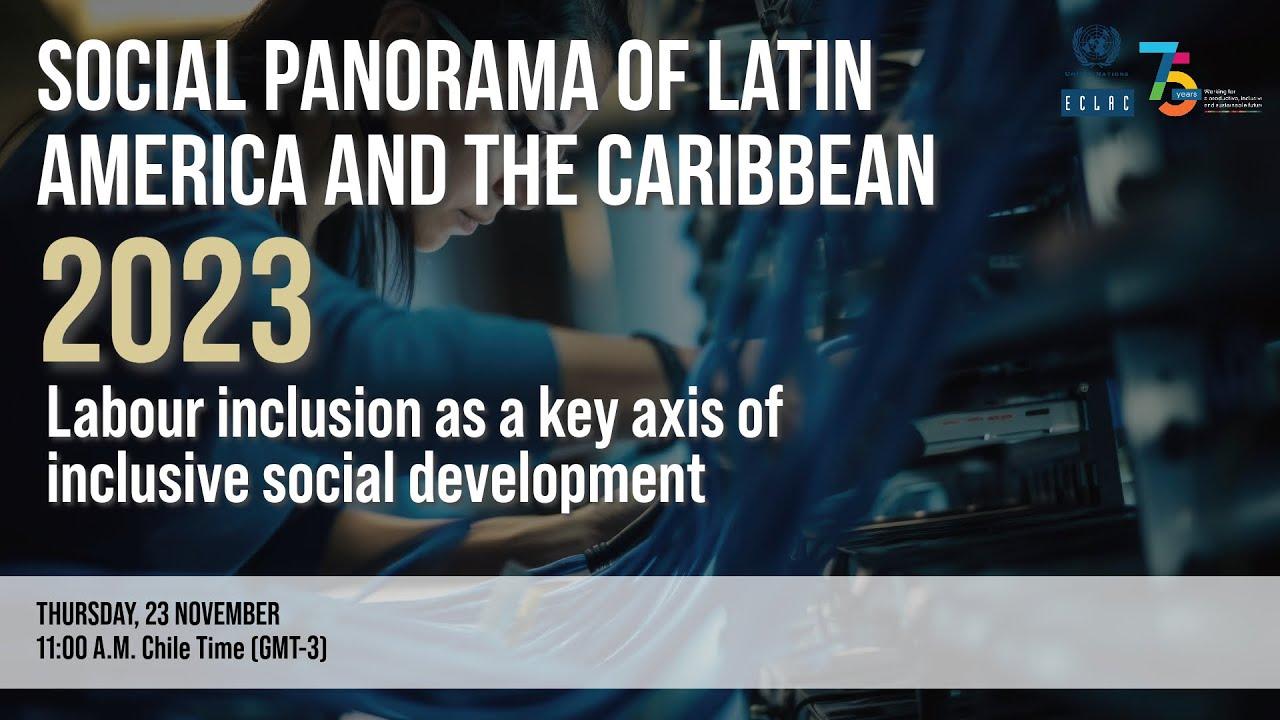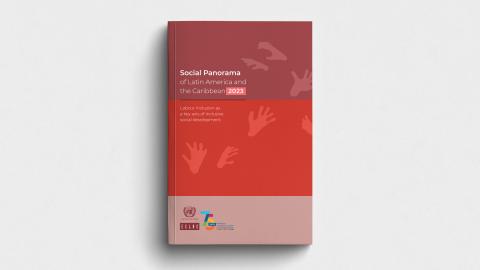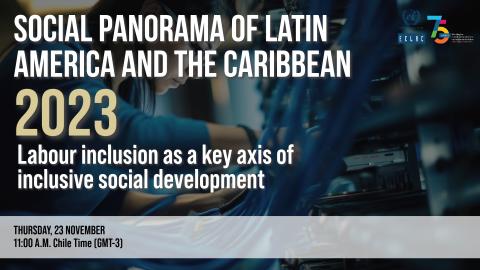video
REMARKS BY MR. JOSÉ ANTONIO OCAMPO, EXECUTIVE SECRETARY OF ECLAC,
AT THE OPENING OF THE TECHNICAL PHASE OF THE
TWENTY-NINTH SESSION OF THE COMMISSION
Brasilia, 6 May 2002
It is a great pleasure to welcome you to the twenty-ninth session of the Economic Commission for Latin America and the Caribbean (ECLAC). I should like to express our deepest appreciation to the Government of Brazil and particularly to its President, its Minister for Foreign Affairs and its Minister of Planning, Budget and Management, as well as to all the members of the Government of Brazil who have helped to make this event possible.
As we embark upon the technical phase of this session today, allow me to share a few thoughts with you regarding the Commission’s work over these past two years.
For ECLAC, as for the entire United Nations, the Millennium Declaration has become the primary point of reference for our efforts. Its goals have been incorporated into both the medium-term plan and our regular programme of work. In particular, I should like to highlight three key priorities for the Commission’s work which derive from the Declaration:
- Poverty reduction policies, including not only social policies but also the impact that economic policies have on poverty and inequality. It is our understanding that the objective set out in the Declaration refers not only to extreme poverty (for which specific targets are established in the Declaration), but also to the alternative definitions of absolute and relative poverty that the Commission has been using in its work for some time. In addition, special attention is paid to gender equity;
- • National policies and regional and international cooperation mechanisms for strengthening and improving our countries´ linkages with the international economy, as well as the interrelationships between economic and social development that have arisen during the current phase of globalization; and
- The links between economic and environmental strategies.
We are determined to make these three priorities an increasingly central focus of our work.
ECLAC has been playing a significantly more active and decisive role in United Nations conferences and summits. In line with the mandates established by the General Assembly and in close cooperation with the Government of Brazil, the United Nations Environment Programme (UNEP), the United Nations Development Programme (UNDP) and the United Nations Department of Economic and Social Affairs, ECLAC organized the Regional Preparatory Conference of Latin America and the Caribbean for the World Summit on Sustainable Development, to be held in Johannesburg, South Africa, in August and September of this year. For that meeting, ECLAC and UNEP prepared an assessment of the challenges and opportunities associated with sustainable development in Latin America and the Caribbean as viewed from an integral development perspective.
The Johannesburg Summit will provide an opportunity to take a fresh look at the region’s priorities in relation to the global sustainable development agenda, to bring the region’s common interests to the fore in the context of those international negotiations, and to influence and participate in the formulation of the commitments to be adopted by heads of State in the future. Without question, financing for sustainable development will continue to be a central issue. In this connection, ECLAC, together with UNDP, prepared an assessment of trends in financing for sustainable development in the region. That study then served as the basis for two meetings which were held to discuss this issue with economic authorities and representatives of the private sector in the region. The first took place during the Regional Preparatory Conference, and the second, during the International Conference on Financing for Development, held in Monterrey, Mexico, this past March. At the Johannesburg Summit another event of this type will be held with the collaboration of UNDP and the Andean Development Corporation.
The region now faces the major challenge of adopting strategies and priorities with a view to consolidating a new global alliance for sustainable development that will revitalize the consensus reached in Rio de Janeiro a decade ago. To this end, ECLAC is committed to supporting the Governments of the region in their efforts to implement the agreements reached in Johannesburg.
At the International Conference on Financing for Development, ECLAC was actively involved in the formulation of the document which the Secretary-General of the United Nations presented to the Preparatory Committee for the Conference. It also organized a Regional Consultation in Bogotá in November 2000 in which the Governments of member countries, the relevant regional and global institutions, and representatives of civil society took part. The main outcome of the secretariat’s work –a study entitled “Growth with stability: financing for development in the new international context”– was widely distributed before and during the Conference in Monterrey. ECLAC also played an important role in the discussion of the various drafts of the Monterrey Consensus, as well as organizing three other preparatory events: a meeting on development banking, a meeting on international and regional financial cooperation —at the request, in this instance, of the Rio Group— and an interregional meeting held by the five regional commissions of the United Nations in Mexico City in January of this year. The Monterrey Consensus represents both a step forward and a firm commitment on the part of the international community, and we will continue to collaborate with all the countries of the region in implementing this accord.
Another Regional Conference in Follow-Up to the World Summit on Social Development was held in 2000. For that meeting, the secretariat of the Commission prepared a document entitled “The equity gap: a second assessment,” in which it provided a regional perspective on the situation with regard to poverty, employment and social integration —the central themes of the Summit— and the public policies most relevant to the fulfilment of the commitments made there.
The Tenth Ibero-American Summit of Heads of State and Government, held in Panama City in November 2000, entrusted ECLAC with the task of preparing, in collaboration with the United Nations Children’s Fund (UNICEF) and the Secretariat for Ibero-American Cooperation (SECIB), a study on “Building equity from the beginning: the children and adolescents of Ibero-America.” This analysis highlights the considerable progress made in overcoming some of the problems that have had a significant impact on children and adolescents in Ibero-America, particularly in the areas of health care, education and nutrition. This document was submitted to the Ibero-American Summit held in late 2001 in Lima and will be presented at the Conference in Follow-Up to the Summit that is taking place this week in New York.
We have also proceeded with the work we carry out on a regular basis in order to monitor and follow up on the outcomes of the International Conference on Population and Development, the United Nations Conference on Human Settlements and the World Assembly on Ageing, and in support of activities relating to the World Conference against Racism, Racial Discrimination, Xenophobia and Related Intolerance. In addition, we are looking forward to making a valuable contribution to the World Summit on the Information Society.
It is important for us to realize that, if we are to strengthen the participation of ECLAC and the other regional commissions in United Nations summits and conferences, we will have to make the transition, once and for all, from our focus on organizing and following up on regional processes and providing technical inputs for the corresponding international deliberations in order to transform ourselves into central actors in those global processes and engage in an ongoing dialogue with specialized departments at United Nations Headquarters and the agencies and funds of the Organization. We are confident in the member countries´ support for our efforts to achieve this objective.
As a regional think tank focusing on economic, social and environmental development issues, ECLAC carries out numerous analytical tasks and technical cooperation activities involving advisory services and training which contribute to the continued institutional development of the Governments of the region. You will have the opportunity to review this programme of work in detail. For now, I would simply like to draw your attention to our five annual flagship publications, which together constitute the most comprehensive source of information on the economic and social situation in the region. These publications are the Preliminary Overview, the Economic Survey, the Social Panorama, the Foreign Investment Report, and Latin America and the Caribbean in the World Economy. All of these documents have become an indispensable reference for experts in these fields, as is demonstrated by the considerable and ever increasing number of citations of these works. In addition, there is the Statistical Yearbook, the foremost output among the Commission’s wide range of statistical publications and activities. These activities have included the commencement of the work of the Statistical Conference of the Americas, whose creation was approved by you in Mexico two years ago.
The modernization the United Nations system involves the incorporation of new technologies that will permit increased transparency, better oversight and virtual “on-line” management of the entire system. This has made it necessary to retrain our staff so that we can adapt to this new environment. The changing demands of our member countries also call for highly qualified and adaptable staff and for new, more flexible programming and budgeting systems. With regard to our staff members, it should be stressed that the institution’s human capital is a function not only of their expertise in their respective fields, but also of their in-depth familiarity with events in the countries of the region and with the analysis and policies networks that are in place in those countries. It is therefore important to ensure that the Organization’s new human resources management system will consolidate these institutional assets. It should also be noted that the current system of programming, which, as you know, has a lead time of almost three years, makes it difficult for us to respond to the changing needs of the member countries in a timely manner.
One of my priorities as Executive Secretary of ECLAC has been to improve the system we use to disseminate our analyses and studies. To this end, we have been working on all three elements of this system: (i) dissemination via the media, which is accomplished mainly through “ECLAC Notes”, press releases and press conferences; (ii) a publications strategy involving the creation of a unified and improved graphic presentation and the promotion of co-publications with commercial publishers; and (iii) development of an ECLAC Internet portal. In addition, a major effort is being made to publish the Commission’s principal publications in more languages. We have increased the number of publications in English and have just launched three books in Portuguese, in addition to the regular publications of our Office in Brasilia. With the assistance of the Government of France, this year we will begin to produce more publications in French as well. Clearly, in order to ensure the continuity and further development of these strategies, it will be necessary both to adopt new technologies and to mobilize more resources.
I should like to make particular mention of the ECLAC portal or web site. Those of you who have not used our site may take the opportunity to familiarize yourselves with it at this meeting. The portal has enabled us to disseminate our work and activities on a broad scale. In 2001, the site attracted more than one and a half million visitors, who downloaded over three million files. Traffic on the site has expanded steadily over the last five years and, as a result, our documents can now be made available much more quickly and can be distributed much more widely than was possible with printed publications. Last year we inaugurated a new, completely decentralized scheme for managing the web site, under which each substantive division, regional headquarters or national office is responsible for posting the activities it conducts in its field of competence. Thanks to these efforts, we currently have 16 thematically and geographically specialized sub-sites.
These are some of the areas that have required the attention of the secretariat during the last two years, and we will examine them in detail during the technical phase of the meeting. As you are aware, in addition to analysing the substantive topic chosen for this session, it is also our job to examine the activities conducted in the biennium 2000-2001; review and approve our programme of work for 2004-2005; and consider, within the relevant committees, the activities the secretariat is pursuing in connection with technical cooperation for development and the progress made in the field of population and development. In addition, on this occasion the Presiding Officers of the Regional Council for Planning of the Latin American and Caribbean Institute for Economic and Social Planning are to convene concurrently with the Commission.
The substantive document “Globalization and development”, which has been prepared by the secretariat and which I will be presenting in detail later on, contains an analysis of the position of Latin America and the Caribbean in the current phase of globalization. It focuses, in particular, on the questions of macroeconomic vulnerability; trade, investment and technological development patterns; environmental sustainability; international migration; and social lags in the region. On the basis of this analysis, the document proposes a regional agenda for the global era. The starting point of this analysis is an awareness of the need for Latin America and the Caribbean to adopt a positive agenda for the construction of a new international order and to make a firm commitment to that agenda. As we shall see, the document asserts that globalization has demonstrated the need to work towards three fundamental objectives: to guarantee an adequate supply of global public goods, to work to overcome global asymmetries and to gradually build a rights-based international social agenda. We will devote a large part of the day to discussing the agenda presented in this document.
Distinguished delegates, I invite you to take an active role in the deliberations of this session and have every confidence that these discussions will make a significant contribution to the strengthening of our Commission.


